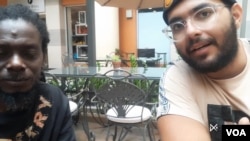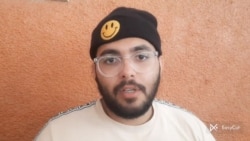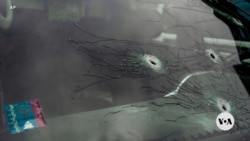YouTube influencer Addison Pierre Maalouf blames “corrupt policemen” of Haiti’s National Police force, PNH, for the ambush that led to his capture by the 400 Mawozo gang.
“We had confirmed an interview with Barbecue [Jimmy Cherizier, leader of the G9 gang alliance], Barbecue had approved us, and we had safe passage until a group of corrupt security set us up – corrupt police officers in the country set us up and set up an ambush on us to kidnap us,” Maalouf told VOA.
VOA Creole was unable to confirm this allegation.
Lanmo Sanjou, leader of the 400 Mawozo gang, held Maalouf and his fixer, Haitian Jean Sacra Sean Roubens for 17 days before releasing them Saturday. The YouTuber says he paid about $50,000 for his release. He said the gang promised to give him back his laptop, equipment and camera they seized, but only relinquished his camera — after removing the SD card — before letting him go.
Maalouf has a popular YouTube channel under the name “YourFellowArab” and has made a name for himself by traveling to dangerous countries where he interviews influencers. Maalouf describes himself as “an adventurer who likes danger.” He has 1.44 million subscribers.
“You know I came to this country [Haiti] because I wanted to give a voice to someone who’s leading an insurrection in this country against a very, very corrupt government,” he told VOA.
The YouTuber decried the corruption he witnessed during his time in Haiti where he says his car was stopped on the street multiple times and asked for “bribes” by “corrupt police officers” whom he alleged were working with the gangs.
Fixer Roubens, who has worked with international media such as CNN, ABC and CBS news, accompanied the YouTuber. Roubens described his time in captivity as “the worst moment of my life.”
“In my 20-year career as a journalist, this is the worst moment of my life. I can’t say I was beaten by the kidnappers, but it was the worst moment for me,” he said.
Roubens said a gang member brandished an M16 rifle as well as a shotgun.
“The guy took out the charger, filled it with bullets and put it back in the gun and he led me to believe if I didn’t give him my weapon and anything else I had on me or prove that I’m not carrying any weapons he’d unload the gun on me,” Roubens said.
He said he was fearful at that moment because although it is something he prepares for in his work as a journalist in Haiti, this was the first time he was kidnapped with a client. Roubens said the experience also saddened him.
“It hurt [my heart] to see kids 12 years old, 13 years old, I’m older than they are. The gangs are recruiting these kids on the street. These are kids the Haitian government should be supporting, providing them with schooling so they can learn and be educated but instead they are in the streets and here’s what they are holding [guns],” Roubens said.
A recent United Nations report said over 1,500 people in Haiti have died due to gang violence since the beginning of 2024. Hundreds of thousands of others have fled their homes and are living on the street.
U.N. agencies and the World Health Organization have expressed alarm over the worsening humanitarian and security situation in Haiti as gangs continue to battle the national police force and each other to control more territory. It is estimated that gangs control over 80% of Haiti’s capital Port-au-Prince as well as cities in the north and south.
YouTuber Maalouf told VOA before his kidnapping, he had spent time enjoying the seaside in Cap Haitien, Haiti’s second largest city, located in the north. He also visited islands off the northern coast, before hitting the road to interview gang leader Barbecue.
“I want to talk so badly about Haiti, but it would be unfair to the people of Haiti if I said that what all these gang members do [committing crimes against foreigners] is what all the Haitian people do,” Maalouf told VOA.
“My experience in Haiti has been horrible because I was kidnapped. But I believe Haiti has beautiful things to offer,” he added.
Barbecue is one of the gang leaders targeted by U.N. and U.S. sanctions citing rampant human rights abuses including the rape of women and children as well as kidnappings. In February he announced a new gang alliance called “Viv Ansanm” (Live Together) alliance and told journalists their goal was to oust Prime Minister Ariel Henry from power and launch a “revolution” to uproot and eliminate the country’s corrupt politicians.
A gang takeover of the areas surrounding the international airport in the capital forced the government to declare a state of emergency and cancel all flights in and out of Port-au-Prince. The prime minister was subsequently unable to return home from official visits to Guyana and Kenya. His private plane was forced to land in Puerto Rico. He announced on March 12 that he would resign after a Transitional Presidential Council to lead the country and organize new elections was up and running.
That has still not happened after weeks of political infighting, death threats and the resignations of several council members.
The plan for a transitional council was agreed upon by Caribbean Community (CARICOM) leaders, Haiti opposition groups, civil society and diaspora representatives in the Jamaican capital, Kingston. The Haitians participated via videoconference, unable to travel because of the closure of Port-au-Prince’s international airport.
Under the plan, six people representing various Haitian political coalitions will be on the transitional council, along with a seventh from the private sector. The seven will be voting members.
There will also be two nonvoting members — one from civil society and one from the interfaith community — according to CARICOM. The council will select an interim prime minister and prepare to hold the next presidential elections.
Maalouf traveled to Haiti from the U.S. at a time when the State Department’s travel advisory for the country is at Level 4: Do Not Travel.
The United States has recently beefed-up security at its embassy in the capital, evacuating nonessential employees and ushering in a new group of U.S. Marine Fleet anti-terrorism security team members.
The United States, Canada and France have also organized charter flights to transport their citizens out of Haiti citing worsening security and gang violence. A State Department spokesperson told reporters the U.S. has facilitated the departure of over 230 U.S. citizens since March 17.
Nike Ching, VOA State Department Correspondent, contributed to this report.








